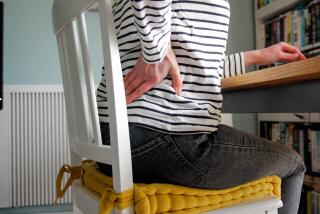Poll Finds Lots of TV Is Painful
- Share via
How do you spell relief?
If you’re seeking relief from pain, avoid watching lots of television or getting intoxicated, suggests a new study conducted by Louis Harris & Associates for New York-based Bristol-Meyers, makers of the analgesic Nuprin.
Heavy television viewers and those who smoke and drink a lot are more likely to experience pain than those who are moderate television viewers, moderate drinkers or nonsmokers, according to the survey, which was conducted earlier this year among a cross section of 1,254 people age 18 or older.
The study did not address whether television program content or simply the sedentary life style of TV watching was to blame, but heavy television viewers were found to be more likely to experience unbearable headaches, backaches and joint pains, especially if they watch TV for five hours or more per day.
Of course, pain is a relative thing. One jogger’s pain is another jogger’s motivating axiom: “No pain, no gain.”
Nevertheless, the report says the American work force loses 550 million work days a year to pain--a figure that the report says translates to a $55-billion loss to the nation’s economy.
Headaches are the most common type of pain. Almost three out of four adults have suffered from one or more headaches in the last year.
However, the types of pain most frequently described as “troublesome” are backaches (16% of all adults), headaches (15%) and joint pains (11%). Ranked much lower were stomach pains (6%), muscle pains (5%), premenstrual or menstrual pains (3%) and dental pains (3%).
The largest group of pain sufferers appears to be women, especially working mothers.
Some 40% of adult women report having suffered premenstrual or menstrual pain in the last year. In addition, 60% of working mothers reported suffering such pain, compared to only 39% of homemakers.
Stress is also a major contributor to pain, the report said. However, other factors such as attitudes and cultural differences also have a bearing on pain.
For example, the report said that people who strongly believe that they are “responsible for their health tend to let pain disrupt their daily lives less often than those who do not hold these beliefs as strongly.”
More to Read
The complete guide to home viewing
Get Screen Gab for everything about the TV shows and streaming movies everyone’s talking about.
You may occasionally receive promotional content from the Los Angeles Times.






